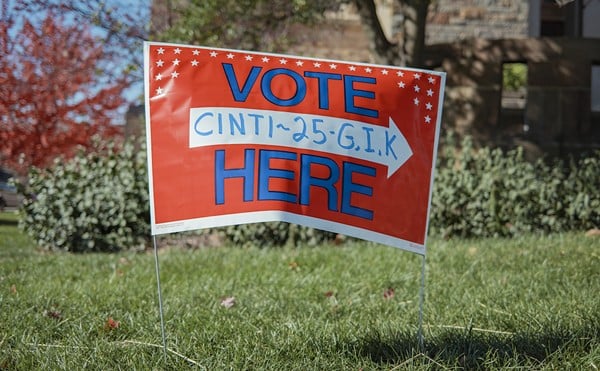This fall, the unsuccessful campaign to bring the Olympics to Cincinnati ran out of money.
After Nick Vehr, president of Cincinnati 2012 Inc. the organization leading the effort, spent $5.5 million of private funds and $250,000 of Kentucky taxpayer money, he asked Ohioans to contribute. In response, Ohio gave $250,000 to Cincinnati 2012 and promised to deliver the same amount in July 2002.
Joseph Robertson approved this $500,000 grant just before resigning as Ohio's development director and signing on at KMK Consulting Company, a subsidiary of a Cincinnati-based law firm, Keating Muething and Klekamp. As Cincinnati 2012 had hired KMK Consulting as its lobbyist, the net result of these events is that Robertson gave $500,000 to a client of his new boss.
State Rep. Chris Redfern (D-Port Clinton) asked Ohio's Inspector General Thomas Charles and David Freel, executive director of the state's ethics commission, to examine Robertson's grant in light of his relationship to the grantee. Ethics laws forbid former state officials who authorize contracts from profiting from those contracts in the private sector.
Responding to Redfern's request for a probe, Marlo Tannous, chief counsel to the Ohio Department of Development, described the timing of the grant and Robertson's employment with KMK Consulting as a "coincidence." Tannous told The Columbus Dispatch that Robertson never worked on Cincinnati 2012 at KMK Consulting.
The "coincidence" giving rise to these possible ethics violations is not the only questionable maneuvers used to get state money into Vehr's hands.
Robertson and Gov. Bob Taft, from whom Cincinnati 2012 initially requested the grant, bypassed the legislative procedure for approving state contracts, violating not the letter but certainly the spirit of a law mandating that the Controlling Board examine all state contracts of $50,000 or more. Because Cincinnati 2012 agreed to promote Ohio in its promotional materials, the $500,000 grant was a contract.
With Ohio in the midst of a fiscal crisis and with legislators and the governor wrangling over a $1.5 billion deficit, the Controlling Board would undoubtedly have denied such a significant expenditure. Consequently, Robertson approved payment of the grant from the Department of Development's operating budget, a pot of money he controlled.
Perhaps the only thing more absurd than spending $500,000 in a year of drastic budget cuts on an Olympic bid that — by all objective accounts — stood little chance of success is the spin that has been put on this expenditure.
Eileen Corson, spokesperson for the Ohio Department of Development, found value in the fact that Cincinnati was one of the eight initial U.S. contenders.
"It opened up the eyes of people that Cincinnati was considered for an international sporting event," Corson told The Dispatch.
Gov. Taft similarly explained his support for the grant at a tourism summit in early November, gushing about the "free advertising" and promotion received by Cincinnati and the state. Why Taft considers a $188,140 expenditure Cincinnati 2012 returned $61,860 free advertising is perplexing, but whatever promotional opportunities existed could have truly been free.
The state granted the money just 17 days before Cincinnati was eliminated by the U.S. Olympic Committee (USOC). Ohio could have easily held onto the money for those 17 days, reaped the benefits of this advertising, and then turned over the grant to Cincinnati 2012 if they made it past the first round.
But whatever the price, the value of the publicity generated is minimal. Cincinnati was considered for an international sporting event not because of the city's attributes, but because a group of businessmen raised millions of dollars and submitted a bid.
Being selected is an honor, competing in an open event is not. It's difficult to imagine a first-round rejection will drawing businesses, conventions or tourists. If anything, the USOC's quick scrapping of Cincinnati focused light on several negative aspects of the city that, whether or not they affected the final decision, received extensive media coverage as factors.
Because of the Olympic bid, the city's racial problems, its lack of public transportation and its infamous law blessing discrimination against people because of their bedroom activities were scrutinized in newspapers around the country.
To prevent a recurrence of such waste, the state needs more restrictive budgetary rules: the Controlling Board should approve contracts over $50,000, period. Ohioans need a governor who won't throw $500,000 at a pie-in-the-sky dream when the economy is spiraling downward, government services are being axed and state employees might be getting pink slips for Christmas.





